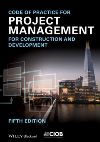Code of practice for project management Fifth edition
NB In May 2022, CIOB published a 6th edition of the code of practice. For more information see: Sixth edition of the Code of Practice for Project Management.
In 1991 the Chartered Institute of Building (CIOB) initiated a multi-institute task force which published the Code of Practice for Project Management for Construction and Development in 1992. It set out for the first time a comprehensive specification for the role of project manager.
The second edition, published in 1996, included new information about public procurement, partnering and risk. Changes included in the third edition, published in 2002, reflected the core stages of the project management processes and the fourth edition, published in 2010, absorbed a range of new themes emerging in the industry.
The 5th Edition, published in September 2014 was completely overhauled to make it more contemporary and was updated and restructured to reflect the new challenges face by the industry. It was prepared in collaboration with a number of key professional bodies.
According to CIOB, good project management relies on balancing time, quality and cost in relation to building functionality and requirements for sustainability. The principles of strategic planning, detailed programming and monitoring, resource allocation and effective risk management, are covered by the guide. The integration of Building Information Modelling (BIM) is also featured. In addition, the impact of trends and developments such as the internationalisation of construction projects and the drive for sustainability are discussed.
Chris Blythe, CIOB chief executive said; “I am pleased to see that the 5th edition of this document is being published at a time where the built environment is gathering great momentum, with a number of high profile projects as well as the resurgence of the housing sector, where construction project management, as a professional service and discipline, is at the forefront of ensuring delivery management.
“The Code of Practice will retain its position as the primary source of guidance on the principles and practice of construction project management irrespective of the size, nature or complexity of the project.”
David Woolven, Chair of the CIOB Working Group said, “This publication is a result of many hours of debate, discussion and re-drafting and a lot of effort has gone into the information contained within this edition. The result I believe has been a truly impressive and highly authoritative guide to the current practice of construction project management, for those who are either involved or likely to be involved in managing projects, irrespective of their previous experience and knowledge in built environment.”
Table of contents:
- Introduction.
- Inception.
- Feasibility.
- Strategy.
- Pre-construction.
- Construction.
- Testing and commissioning.
- Completion, handover and operation.
- Post-completion review and in use.
- Glossary.
- Bibliography.
NB: On 26 September 2016, CIOB launched its first Code of Practice for Programme Management. Programme management is the process of managing several related projects, often with the intention of improving an organisation’s performance. The code sets out the requirements for effective programme management, ensuring systematic quality control and documentation through governance arrangements and explains the benefits of managing a number of connected projects as a programme.
--CIOB
[edit] Related articles on Designing Buildings
- A solution to handle large and complex construction projects: Interface Management.
- Association for Project Management APM
- Business administration.
- Code of practice for programme management.
- CIOB.
- Conflict of interest.
- Design management.
- Microsoft's six ways to supercharge project management.
- Monte Carlo simulation.
- Preliminary business case.
- Project execution plan.
- Projectisation.
- Project management.
- Risk management.
- Sixth edition of the Code of Practice for Project Management.
- Value management.
Featured articles and news
UKCW London to tackle sector’s most pressing issues
AI and skills development, ecology and the environment, policy and planning and more.
Managing building safety risks
Across an existing residential portfolio; a client's perspective.
ECA support for Gate Safe’s Safe School Gates Campaign.
Core construction skills explained
Preparing for a career in construction.
Retrofitting for resilience with the Leicester Resilience Hub
Community-serving facilities, enhanced as support and essential services for climate-related disruptions.
Some of the articles relating to water, here to browse. Any missing?
Recognisable Gothic characters, designed to dramatically spout water away from buildings.
A case study and a warning to would-be developers
Creating four dwellings... after half a century of doing this job, why, oh why, is it so difficult?
Reform of the fire engineering profession
Fire Engineers Advisory Panel: Authoritative Statement, reactions and next steps.
Restoration and renewal of the Palace of Westminster
A complex project of cultural significance from full decant to EMI, opportunities and a potential a way forward.
Apprenticeships and the responsibility we share
Perspectives from the CIOB President as National Apprentice Week comes to a close.
The first line of defence against rain, wind and snow.
Building Safety recap January, 2026
What we missed at the end of last year, and at the start of this...
National Apprenticeship Week 2026, 9-15 Feb
Shining a light on the positive impacts for businesses, their apprentices and the wider economy alike.
Applications and benefits of acoustic flooring
From commercial to retail.
From solid to sprung and ribbed to raised.
Strengthening industry collaboration in Hong Kong
Hong Kong Institute of Construction and The Chartered Institute of Building sign Memorandum of Understanding.
A detailed description from the experts at Cornish Lime.

























